[:en]
 |
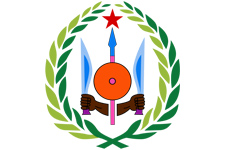 |
|
| The Flag of Djibouti | The Emblem of Djibouti | The National Anthem |
Political System
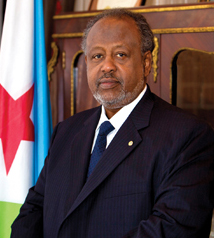
H.E. Mr. Ismail Omar Guelleh
President of the Republic of Djibouti
Head of Government
Djibouti is a republic presidential and pluralistic. The President of the Republic who is also head of government, is elected by direct universal suffrage for 6 years. He appoints the different ministers on Prime Minister’s proposal and may dismiss them. Ministers are responsible for implementing government policy. The legislative power is vested in the National Assembly consists of a single chamber with 65 members elected by universal suffrage on a list for 5 years.
There is a mutual independence of the President of the Republic and the National Assembly. The President does not have the power to dissolve the assembly and that – it cannot, in turn, to question the President’s responsibility.
Other institutions provided for by the constitution are the Constitutional Council, the Higher Judicial Council, the High Court of Justice and the Ombudsman.
History
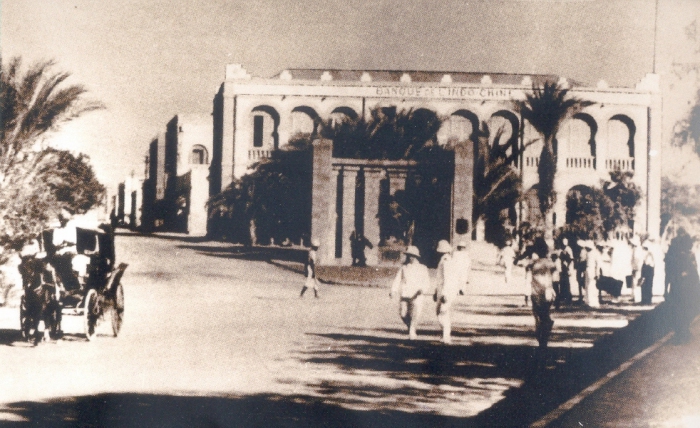
The Horn of Africa has always been a cultural and commercial crossroads between Africa and Asia, and especially Arabian peninsula. Contacts with populations of Arabian peninsula intensified in the 7th century with the spread of Islam in the region and the creation of Muslim kingdoms. The first lasting contacts with European dates from 1839. In 1862, local leaders of the country signed treaties with the French who founded Djibouti in 1888, the current capital of the Republic of Djibouti.
The territory became a colony under the name of French Somaliland and French Territory of the Afars and Issas in 1967.Après three decades of advocacy and protest led by the LPAI (African People’s Independence League), the colonial power organized referendum May 8, 1977 where the majority of the territory’s population voted for independence.
The country gained independence 27 June 1977 as the Republic of Djibouti and Hassan Gouled Aptidon was appointed as the first President of the country.
Location & Geography
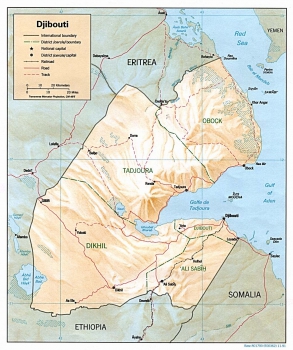 The Republic of Djibouti, with an area of 23,200 km2, is located in the Horn of Africa and shares borders with Eritrea in the north, Ethiopia in the west and south, and Somalia in the south – Est. It has a long coastline of 370 km, which overlooks the Red Sea and Gulf of Aden
The Republic of Djibouti, with an area of 23,200 km2, is located in the Horn of Africa and shares borders with Eritrea in the north, Ethiopia in the west and south, and Somalia in the south – Est. It has a long coastline of 370 km, which overlooks the Red Sea and Gulf of Aden
The terrain is mainly a desert-like plain with some intermediate mountain ranges near the eastern border. There is one active volcano and there are seasonal streams that flow toward the sea or into the two salt lakes.
Djibouti is an important junction of communications in the Horn of Africa linking Europe to Asia via the Red Sea, on the one hand, and Africa to the Gulf countries in the Indian Ocean, on the other hand. Thus, placed on one of the busiest shipping lanes in the world, Djibouti has an indisputable geostrategic position. This position was reinforced by the new context that the fight against maritime piracy in the Gulf of Aden.
Climate
Djibouti has a semiarid climate that is very hot and dry. There are two seasons, a dry season from May to October and a relatively cool season from November to April. Temperatures range from very warm during the months of December, January and February (with average temperatures between 23 – 29 °C) to extremely hot in July (31 – 41 °C), with oppressive humidity adding to the uncomfortable conditions.
The rainfall on the coast usually occurs between November and March, whereas in the interior it falls between April and October. Average annual precipitation for Djibouti City is 130 mm.
Population

The population of Djibouti is estimated by 1998 to 680,000 inhabitants, more than two-thirds live in Djibouti City, the capital of the country. The majority of the population (98%) is Sunni Muslim rite. The population growth rate is very high (6%) of which 3% of the migratory flows and young people under 20 years account for nearly 53% of the population.
The official languages are French and Arabic. Somali and Afar are the national languages.
Tourism

Djibouti is an extraordinary country to explore, its geological sites, which are unique, have always, and attracted scientists and adventurers in search of extreme sensations and change. Indeed, from the chain of mountains in the North, including the Day relict forest, to the sandy coast in the East, going through the lunar and volcanic landscapes in Lake Abbe, the diversity of Djibouti’s landscape comes to life the moment your plane begins its descent with promises of a long list of things to do.
There are great opportunities for island-hopping between Moucha, Maskali, Sable Blanc and Sept Frères islands. Djibouti is so much more than just a beautiful destination with sandy beached and clear azure waters. If you’re into relaxation and just kicking back and enjoying the down-time, Djibouti has all you’ll ever need, from a selection of beaches and islands, to a wide selection of places where to acquire the special glow of a tan all year around, refreshed by dips into crystal waters or even a snorkel to introduce you to the amazing world just beneath the waves.
You may dive in Djibouti If you’re a diver, expert or beginner, then you’ve come to the right place for unforgettable diving in waters teeming with marine life and spectacular underwater landscapes. A section of professional land-based and live-aboard dive operators will introduce you to a number of exceptional sites where surprisingly few have ventured. The waters of the Red Sea attract divers from all over the world and waters of Djibouti are renowned as some of the best in the region.
Lake Assal You will also find breathtaking landscapes and various excursions will introduce you to Lake Assal, one of the wonders of Djibouti. It is the world’s third largest salt water lake and the continent’s lowest point 150 meters below sea level.

Economic
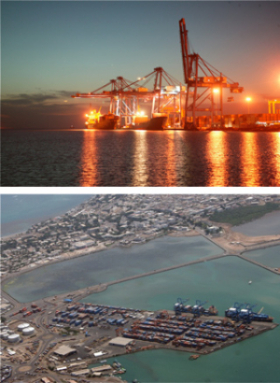 Economic and social development of Djibouti has changed considerably since 2006. In 2011 and 2012, economic growth should reach 4.6 and 5.1% respectively, with the resumption of port activities and the influx of foreign direct investment (FDI) which is encouraged, except in public utilities.
Economic and social development of Djibouti has changed considerably since 2006. In 2011 and 2012, economic growth should reach 4.6 and 5.1% respectively, with the resumption of port activities and the influx of foreign direct investment (FDI) which is encouraged, except in public utilities.
Foreign investment primarily goes to the services sector (transportation, construction, finance, and hotel/gastronomy), and foreign banks dominate the banking sector.
The economy was supported by a massive influx of capital in the form of foreign direct investment, almost exclusively from Gulf States and China. Investment was mainly achieved in transport (especially port operations), real estate, hotels and banking. Investment has been concentrated in capital-intensive activities, essentially in the tertiary sector, the chief driving force of economic growth in Djibouti.
Djibouti encourage foreign investment and the Djibouti National Investment Promotion Agency (NIPA), created in 2001, promotes private-sector investment, facilitates investment operations, and works to modernize the country’s regulatory framework.
Investment
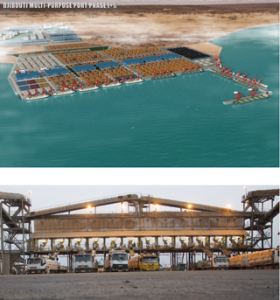 As part of Vision 2035, the Republic of Djibouti focuses on the development of roads, ports, airports and telecommunications infrastructure in order to make. Djibouti hub of regional and international traffic.
As part of Vision 2035, the Republic of Djibouti focuses on the development of roads, ports, airports and telecommunications infrastructure in order to make. Djibouti hub of regional and international traffic.
To this end, massive investment effort in the amount of approximately $ 6 billion has been undertaken by the ports of Djibouti and Free Zones Authority (DPFZA) to expand its activities and support economic growth of its neighbors such as Ethiopia and the newest independent nation of South Sudan.
The 42 acre Djibouti Free Zone has been operational since 2004 and can house up to 100 companies. In July 2012, the government approved a new 57 hectares free zone (Jabanaas Free Zone) just outside of the capital.
Finance
With an exchange rate policy focused on maintaining a fixed exchange rate with the dollar, the Bank of Djibouti has suffered financial liberalism that allows it to become a regional financial base offering services attractive, vibrant and safe for regional operators. The financial sector also benefits from the extra boost in the submarine cable system that ensures fast and secure transactions. Currently, Djibouti has eleven banks serving a population of 800,000.
The banking sector plays a vital role in the national economy and geographical position of Djibouti and its political and economic stability have enabled the nation to create a dynamic financial sector.
The presence of a freely convertible and stable currency combined with a unique geographical position and banking infrastructure and a modern and reliable telecommunication network makes the financial sector in Djibouti dynamic and attractive. Regional investors and businessmen are welcome to Djibouti. We provide all the facilities you need quickly and safely. It is unique in Africa.
Djibouti has no foreign exchange restrictions. There are no limitations on converting or transferring funds, or on the inflow and outflow of cash. The Djibouti franc, which has been pegged to the U.S. dollar since 1949, is stable. The fixed exchange rate is 177.71 Djibouti francs to the dollar.
Peace
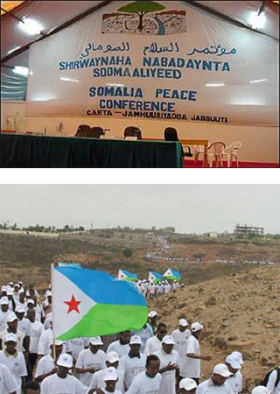 The foreign policy of the Republic of Djibouti has encouraged the cordial agreement and the peaceful settlement of disputes between states, but hardly bend is a compromise and half perverse solutions.
The foreign policy of the Republic of Djibouti has encouraged the cordial agreement and the peaceful settlement of disputes between states, but hardly bend is a compromise and half perverse solutions.
It is modern, progressive and proactive especially focused particularly on Diplomatic actions for prevention, management and resolution of conflicts.
The foreign policy of the Republic of Djibouti remains a formidable instrument relay the aspirations of the Djiboutian people and their contribution to peace and development in the sub-region and the world.
Peace and justice as a value, the active diplomacy and persistence as the means and prosperity for all as ultimate ambition, are the pillars of the foreign policy of the Republic of Djibouti.
Education

In Djibouti since 2000, significant progress has been made in education. The net enrollment rate increased from 43% in 2002 to 66% in 2006. In urban areas, 67% of children are enrolled in primary school, against 49% in rural areas. Gender equality at the national level is almost reached
The University Centre, established in 2001 was turned the first full University of Djibouti was established in October 2006. The University of Djibouti is the only French-language university in the Arabic and English regional context the Horn of Africa. This feature makes it a privileged partner of the Francophone and the teaching of French in the region. The University of Djibouti maintains a strong academic partnership with several universities and institutions French. The Faculty of Engineering was inaugurated on September 29, 2013 and funded by the Turkish government.
The recent creation of the Faculty of Medicine of Djibouti for the training of doctors on site, reinforce training initial and continuing training of health workers.
Agriculture
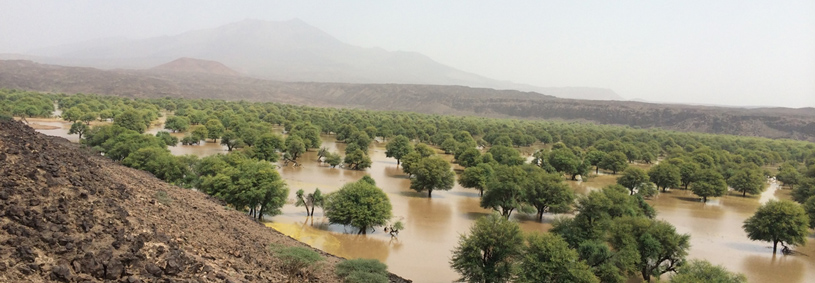
Agriculture in Djibouti is very limited and restricted. There is severe scarcity of water in the countryside of the Djibouti Africa. So there is not much scope for varied forms of vegetation and agriculture in Djibouti. Djibouti agriculture contributed about 4 percent or little more to the GDP of the country.
Agriculture consists of growing of tomatoes in the country that is usually for the purpose of household utilization. Date palms are also produced along the coastal fringes of the country.
Djibouti geography does not support much variety in the flora of the country. The production in the area of agriculture is limited to a certain extent.
In Djibouti, farm animals have always received greater importance in comparison to farming and agriculture. The agriculture in Djibouti consists of vegetables and fruits. The agricultural products of the country of Djibouti also consist of goats, animal hides, camels and sheep. In the year 2001, the trade in of grain in Djibouti amounted to about 37,970 tons.

Social

Djiboutians enjoy meeting foreigners but not all are comfortable speaking English. French language ability is helpful for business and socializing in the community. Djiboutian socializing is in the form of dinners or get-togethers. They are numbers of clubs ( Lions and Rotary Clubs) in Djibouti and provide opportunities to meet members of the international community.
 |
 |
|
| Le drapeau de Djibouti | L’emblème de Djibouti | L’hymne national |
Système Politique

S.E. M. Ismail Omar Guelleh
Président de la République de Djibouti
Chef du gouvernement
Djibouti est une république de type présidentiel et pluraliste. Le Président de la République qui est aussi chef du gouvernement, est élu au suffrage universel direct pour 6 ans. Il nomme les différents ministres sur proposition du premier Ministre et peut les révoquer. Les Ministres sont chargés de mettre en œuvre la politique du gouvernement. Le pouvoir législatif revient à l’Assemblée Nationale constituée d’une chambre unique avec 65 députés élus au suffrage universel sur une liste pour 5 ans.
Il y a une indépendance réciproque du Président de la République et de l’Assemblée Nationale. Le Président ne dispose donc pas du pouvoir de prononcer la dissolution de l’assemblée et celle – ci ne peut, de son côté, mettre en cause la responsabilité du Président.
Les autres institutions prévues par la constitution sont le Conseil Constitutionnel, le Conseil Supérieur de la Magistrature, la Haute Cour de Justice et le Médiateur de la République.
Histoire
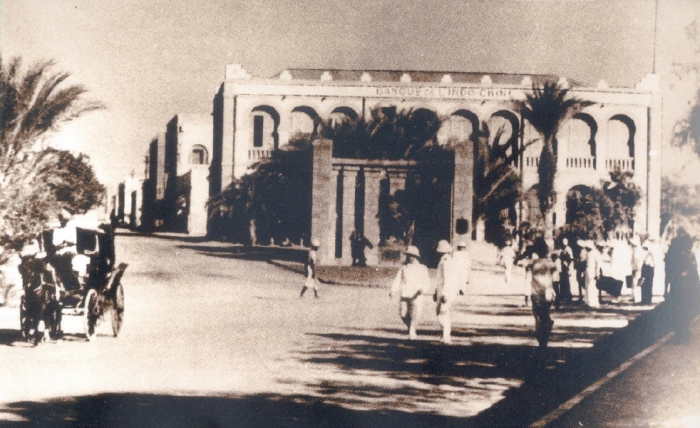
La Corne de l’Afrique a toujours été un carrefour culturel et commercial entre l’Afrique et l’Asie et en particulier l’Arabie. Les contacts avec les populations de l’Arabie se sont intensifiés au 7ème siècle avec la propagation de l’islam dans cette région et la constitution de royaumes musulmans. Les premiers contacts durables avec les européens datent de 1839. En 1862, les chefs locaux de la contrée signèrent des traités avec les français qui fondèrent en 1888 Djibouti, l’actuelle capitale de la République de Djibouti.
Le territoire devient une colonie sous le nom de Côte Française des Somalis puis Territoire Français des Afars et des Issas en 1967.Après trois décennies de revendication et de contestation animée par la LPAI (Ligue Populaire Africaine pour l’Indépendance), la puissance coloniale organisa un référendum le 8 mai 1977 où la majorité de la population du territoire vota pour l’indépendance.
Le pays accéda à l’indépendance le 27 juin 1977 sous le nom de République de Djibouti et Hassan Gouled Aptidon fut désigné comme premier Président du pays.
Position & Géographie
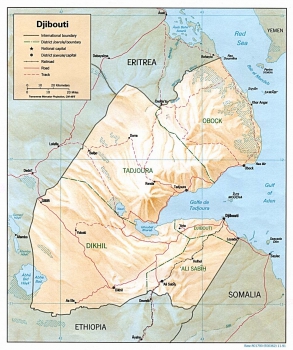 La République de Djibouti, dotée d’une superficie de 23.200 km2, est située dans la Corne de l’Afrique et partage des frontières avec l’Érythrée au Nord, l’Éthiopie à l’Ouest et au Sud et avec la Somalie au Sud – Est. Elle possède une façade maritime longue de 370 km qui donne sur la Mer Rouge et le Golfe d’Aden.
La République de Djibouti, dotée d’une superficie de 23.200 km2, est située dans la Corne de l’Afrique et partage des frontières avec l’Érythrée au Nord, l’Éthiopie à l’Ouest et au Sud et avec la Somalie au Sud – Est. Elle possède une façade maritime longue de 370 km qui donne sur la Mer Rouge et le Golfe d’Aden.
Le terrain est principalement une plaine désertique avec quelques chaînes de montagnes intermédiaires près de la frontière orientale. Il y a un volcan actif et il y a cours d’eau saisonniers qui coulent vers la mer ou dans les deux lacs salés.
Djibouti est un carrefour important des communications dans la Corne de l’Afrique entre l’Europe et l’Asie via la mer Rouge, d’une part, et de l’Afrique vers les pays du Golfe dans l’océan Indien, d’autre part. Ainsi, placé sur l’une des routes maritimes les plus fréquentées au monde, Djibouti a une position géostratégique indéniable. Cette position a été renforcée par le nouveau contexte que la lutte contre la piraterie maritime dans le golfe d’Aden
Climat
Djibouti a un climat semi-aride qui est très chaud et sec. Il y a deux saisons, une saison sèche de Mai à Octobre et une saison relativement fraîche de Novembre à Avril. Les températures varient de très chaud pendant les mois de Décembre, Janvier et Février (avec des températures moyennes entre 23 à 29 ° C) à extrêmement chaud en Juillet (31-41 ° C), avec une humidité accablante ajoutant aux conditions inconfortables.
Les précipitations sur la côte se produit généralement entre Novembre et Mars, tandis que dans l’intérieur, il se situe entre Avril et Octobre. Les précipitations annuelles moyennes pour la ville de Djibouti est de 130 mm.
Population

La population de Djibouti est estimée en 1998 à 680.000 habitants dont plus de deux tiers vit dans Djibouti-ville, la capitale du pays. Le taux d’accroissement de la population est très élevé (6%) dont 3% du au flux migratoire. La majorité de la population (98%) est de religion musulmane de rite sunnite. Les jeunes de moins de 20 ans représentent près de 53% de la population du pays.
Les langues officielles du pays sont le français et l’arabe. Le somali et l’afar sont les langues nationales.
Tourisme

Djibouti est un pays extraordinaire à explorer, ses sites géologiques, qui sont uniques, ont toujours, et attirés par les scientifiques et les aventuriers à la recherche de sensations extrêmes et le changement. En effet, à partir de la chaîne de montagnes dans le Nord, y compris la forêt relique de Day, à la côte de sable dans l’Est, en passant par les paysages lunaires et volcaniques dans le lac Abbe, la diversité du paysage de Djibouti vient à la vie le moment votre avion commence son descente avec des promesses d’une longue liste de choses à faire.
Il y a de grandes possibilités de saut de l’île entre Moucha, Maskali, Sable Blanc et Sept Frères îles. Djibouti est tellement plus qu’une belle destination échouée de sable et les eaux claires d’azur. Si vous êtes dans la détente et simplement avoir du recul et profiter le temps d’arrêt, Djibouti a tout ce que vous aurez jamais besoin, à partir d’une sélection de plages et des îles, à une large sélection de lieux où acquérir l’éclat particulier d’un bronzage toute l’année autour, rafraîchi par plonge dans les eaux de cristal ou même un tuba pour vous présenter le monde merveilleux juste sous les vagues.
Vous pouvez plonger à Djibouti si vous êtes un plongeur, un expert ou débutant, alors vous êtes au bon endroit pour la plongée inoubliable dans les eaux grouillantes de vie marine et des paysages sous-marins spectaculaires. Une section professionnel des opérateurs de plongée vous fera découvrir un certain nombre de sites exceptionnels où étonnamment peu se sont aventurés. Les eaux de la mer Rouge attirent plongeurs de partout dans le monde et les eaux de Djibouti sont reconnu comme l’un des meilleurs dans la région.
Au Lac Assal vous trouverez également des paysages à couper le souffle et diverses excursions vous présenterons lac Assal, l’une des merveilles de Djibouti. C’est le troisième plus grand lac d’eau salée du monde et le plus bas point du continent africain à 150 mètres en dessous du niveau de la mer.

Économique
 Le développement économique et social de Djibouti a considérablement changé depuis 2006. En 2014 et 2015, la croissance économique devrait atteindre 4,6 et 5,1% respectivement, avec la reprise des activités portuaires et l’afflux d’investissements directs étrangers (IDE), qui est encouragé.
Le développement économique et social de Djibouti a considérablement changé depuis 2006. En 2014 et 2015, la croissance économique devrait atteindre 4,6 et 5,1% respectivement, avec la reprise des activités portuaires et l’afflux d’investissements directs étrangers (IDE), qui est encouragé.
L’investissement étranger va principalement pour le secteur des services (transport, construction, financement et hôtellerie / gastronomie), et les banques étrangères dominent le secteur bancaire.
L’économie a été soutenue par un afflux massif de capitaux sous forme d’investissements étrangers directement, presque exclusivement des pays du Golfe et la Chine. Il a été réalisé principalement un investissement dans les transports (Surtout opérations portuaires), l’immobilier, les hôtels et les services bancaires. L’investissement a été concentré dans les activités à forte intensité de capitaux, dans le secteur tertiaire essentiellement, la force motrice principale de la croissance économique à Djibouti.
Djibouti encourage l’investissement étranger et l’Agence Nationale pour la Promotion des Investissements Djibouti (ANPI), créé en 2001, favorise l’investissement du secteur privé, facilite les opérations d’investissement, et s’efforce de moderniser le cadre réglementaire du pays.
Investissement
 Dans le cadre de Vision 2035, le République de Djibouti se concentre sur le développement des routes, des ports, des aéroports et des infrastructures de télécommunications afin de rendre Djibouti le hub du trafic régional et international.
Dans le cadre de Vision 2035, le République de Djibouti se concentre sur le développement des routes, des ports, des aéroports et des infrastructures de télécommunications afin de rendre Djibouti le hub du trafic régional et international.
À cette fin, effort d’investissement massif pour un montant d’environ 6 milliards de dollars a été entrepris par les ports de Djibouti et l’Autorité des zones franches ( DPFZA ) pour développer ses activités et soutenir la croissance économique de ses voisins comme l’Ethiopie et de la nation indépendante récent du Soudan du Sud.
Le 42 hectares des zones franches de Djibouti ( DPFZA ) est opérationnel depuis 2004 et peut accueillir jusqu’à 100 entreprises. En Juillet 2012, le gouvernement a approuvé une nouvelle zone franche de 57 hectares (Jabanaas Free Zone) juste à l’extérieur de la capitale.
Financement
Avec une politique de taux de change axée sur le maintien d’une parité fixe avec le dollar, la Banque de Djibouti a subi libéralisme financier qui lui permet de devenir une base financière régionale offrant des services attractifs, dynamique et sécuritaire pour les opérateurs régionaux. Le secteur financier bénéficie également de l’impulsion supplémentaire dans le système de câble sous-marin qui garantit des transactions rapides et sécurisées.
Actuellement , Djibouti dispose de onze banques desservant une population de 800.000.
Le secteur bancaire joue un rôle vital dans l’économie nationale et la position géographique de Djibouti et sa stabilité politique et économique ont permis à la nation pour créer un secteur financier dynamique.
La présence d’une monnaie librement convertible et stable combinée à une position géographique unique et infrastructure bancaire et un réseau de télécommunication moderne et fiable rend le secteur financier de Djibouti dynamique et attractif. Les investisseurs régionaux et hommes d’affaires sont les bienvenus à Djibouti. Nous donnons toutes les facilités que vous avez besoin rapidement et en toute sécurité. Il est unique en Afrique.
Djibouti n’a pas de restrictions de change. Il n’y a pas de limitations sur la conversion ou le transfert de fonds ou sur les entrées et sorties d’argent. Le franc Djibouti, qui a été arrimé au dollar américain depuis 1949, est stable. Le taux de change fixe est 177,71 francs Djibouti au dollar.
Paix
 La politique étrangère incite a l’entente cordial et au règlement pacifique des différents entre états mais ne se plie guère a la compromission et aux demi solutions perverses.
La politique étrangère incite a l’entente cordial et au règlement pacifique des différents entre états mais ne se plie guère a la compromission et aux demi solutions perverses.
Elle se veut moderne, progressiste et surtout proactive axée en particulier sur les actions Diplomatiques de prévention, de gestion et de résolution des conflits.
La politique étrangère de la République de Djibouti demeure un formidable instrument de relais des aspirations du peuple Djiboutien et sa contribution à la paix et au développement dans la sous-région et dans le monde.
La paix et la justice comme valeur, la diplomatie agissante et la persévérance comme le moyen et la prospérité pour tous comme ultime ambition, tels sont les piliers de la politique étrangère de la République de Djibouti.
Éducation

A Djibouti depuis 2000, des progrès significatifs ont été réalisés dans l’éducation. Le taux net de scolarisation est passé de 43% en 2002 à 66% en 2006. Dans les zones urbaines, 67% des enfants sont inscrits à l’école primaire, contre 49% dans les zones rurales. L’égalité des sexes au niveau national est presque atteint.
Le Pôle Universitaire, créé en 2001 et dispensant l’Enseignement Supérieur, est transformé en une Université nationale de plein exercice en 2006. L’Université de Djibouti est la seule université de langue française dans le contexte régional arabe et en anglais de la Corne de l’Afrique. Cette caractéristique en fait un partenaire privilégié de la Francophonie et de l’enseignement du français dans la région. L’Université de Djibouti maintient une forte partenariat académique avec plusieurs universités et institutions françaises. La Faculté d’ingénieurs a été inaugurée le 29 Septembre 2013 et financée par le gouvernement turc.
La création récente de la Faculté de médecine de Djibouti pour la formation des médecins sur place, renforcer la formation initiale et la formation des agents de santé continue.
Agriculture

L’Agriculture à Djibouti est très limité et restreint. Il y a une grave pénurie d’eau dans la campagne de Djibouti. Il n’y a donc pas beaucoup de possibilités de formes variées de la végétation et de l’agriculture à Djibouti. Djibouti agriculture a contribué pour environ 4 pour cent ou un peu plus au PIB du pays.
L’Agriculture se compose de plus en plus de tomates dans le pays qui est généralement pour l’utilisation domestique. Les palmiers dattiers sont également produites le long des franges côtières du pays.
La géographie de Djibouti ne supporte pas beaucoup de variété dans la flore du pays. La production dans le secteur de l’agriculture est limitée dans une certaine mesure.
A Djibouti, les animaux de ferme ont toujours reçu plus d’importance par rapport à l’agriculture. L’agriculture à Djibouti se compose de légumes et de fruits. Les produits agricoles du pays de Djibouti sont également constitués de chèvres, peaux d’animaux, chameaux et de moutons. En 2001, le commerce des grains à Djibouti s’élevait à environ 37 970 tonnes.

Social

Les Djiboutiens aiment rencontrer les étrangers, mais tous ne sont pas à l’aise en anglais. La connaissance de la langue française est utile pour les affaires et la socialisation dans la communauté. La socialisation Djiboutienne est sous la forme de dîners ou rencontres. Il y a des nombres de clubs (clubs Lions et Rotary) à Djibouti qui offrent la possibilité de rencontrer des membres de la communauté internationale.
 |
 |
|
| 国旗 | 国章 | 国歌 |
政治体制

元首
イスマイル・オマール・ゲレ大統領
ジブチは大統領共和制と複数政党制を導入しています。元首でもある大統領は直接普通選挙で選ばれ、任期は6年です。首相の提案に基づき、大統領は閣僚を指名します。大統領には、閣僚罷免の権限も与えられています。各閣僚は、政府の政策を実施する義務があります。立法権は、普通選挙で選ばれる65人の議員(任期は5年)から成る1院制の国民議会に属します。
大統領と国民議会は相互に独立しており、大統領には議会の解散の権限がなく、一方、議会は大統領の責任を追及することができません。
憲法に定められている他の機関には、憲法評議会、高等司法評議会、最高裁判所、オンブズマンがあります。
歴史

アフリカの角(Horn of Africa)はかねて、アフリカとアジア、特にアフリカとアラビア半島を文化および商業分野で結ぶ十字路として機能してきました。アラビア半島の住民との接触は7世紀に、地域でのイスラム教の布教とイスラム王朝の誕生とともに強まりました。欧州との永続的な関係が初めて生まれたのは1839年に遡ります。1862年には、地元の指導者らはフランスと条約を結び、1888年に現在のジブチ共和国の首都であるジブチが建設されました。
領地はかつてフランス領ソマリランドと呼ばれ、1967年にはフランス領アファル・イッサに改称されました。アフリカ人民独立連合(LPAI)による30年間にわたる抵抗運動の後、宗主国は1977年に住民投票を実施し、過半数が独立を支持しました。
1977年6月27日にジブチ共和国として独立し、ハッサン・グレド・アプティドンが初代大統領に指名されました。
位置と地理
 ジブチ共和国は、面積2万3200平方キロメートルで、アフリカの角に位置しています。北部はエリトリア、西部と南部はエチオピア、南東部はソマリア各国と国境を接しています。紅海とアデン湾に臨み、沿岸の長さは370キロメートルです。
ジブチ共和国は、面積2万3200平方キロメートルで、アフリカの角に位置しています。北部はエリトリア、西部と南部はエチオピア、南東部はソマリア各国と国境を接しています。紅海とアデン湾に臨み、沿岸の長さは370キロメートルです。
国土は主に砂漠状の平野からなり、東部の国境近くに中位の高さのいくつかの山並みが広がっています。活火山が1つあり、季節河川からの流れは、海に向かうか、2つの塩湖へ注がれます。
ジブチはアフリカの角に位置する交通の重要な分岐・合流点で、紅海経由で欧州とアジアを、その一方で、インド洋に至る湾岸諸国とアフリカを、それぞれ結んでいます。このため、ジブチは世界で最も輸送量の多い海上交通路の1つに面していることから、戦略地政学的な位置の重要性は疑う余地がありません。アデン湾における海賊との戦いという新たな要因も加わり、こうしたジブチの戦略地政学的な重要性は強まりました。
気候
ジブチはステップ気候で非常に暑くて乾燥しています。2季しかなく、5月から10月は乾燥シーズン、11月から4月が比較的涼しいシーズンです。気温は変化に富み、12月、1月、2月の間は非常に温かく(平均気温は23-29度)、一方、7月は猛暑(31-41度)に見舞われ、湿気が強く、不快感が増します。
雨は沿岸部で通常、11月から3月、内陸部では4月から10月に降ります。ジブチ市の年間平均降雨は130ミリメートルです。
人口

ジブチの人口は1998年時点で68万人と推定され、うち3分の2以上が首都のジブチ市に居住しています。人口の大半(98%)がイスラム教スンニ派です。人口の増加率は極めて高く6%で、20歳未満が人口の53%を占めています。
公用語はフランス語とアラビア語。ソマリ語とアファル語も使用を認められています。
旅行

ジブチは探索に格好の国です。地質学的な探索スポットはユニークで、強烈な感動や変化を追い求める科学者や冒険家をかねて魅了してきました。実際、ダイの森が隠れる北部に連なる山々をはじめ、東部の沿岸には砂浜が、さらにアベ湖では月面を思わせる光景や火山の景観が広がります。飛行機が下降し始め、ジブチの自然が織りなす風景が見えてきたら、予定リストがいっぱいになることをお約束します。
ムシャ、マスカリ、サブルブラン、セットフレールの島めぐりツアーは、すばらしい機会となるでしょう。抜けるような紺碧の海、それに続く砂浜の美しさを堪能するだけのツアーでは終わりません。ゆっくりリラックスし、安息の時間をエンジョイするために、ジブチは必要なものをすべて提供します。数々のビーチと島々、肌を焼くための場所なら1年を通して探すのに困りません。水晶のように澄み切った海に入りリフレッシュしてもよいし、また、シュノーケルで潜れば、水面の真下に広がる驚異の世界へと誘われ、心身ともに癒されるでしょう。
ダイビングをお考えなら、ジブチは、熟練のダイバーにとっても、あるいはビギナーのダイバーにとっても最適の場所です。海洋生物と素晴らしい海中の眺めを満喫できるダイビングは忘れがたい思い出となるでしょう。地元のプロのダイバーとダイビングの専門業者は、未開の有数のスポットをご紹介することでしょう。紅海の海中は、世界中のダイバーの憧れの場所です。ジブチの海は、周辺地域で屈指のダイビングスポットとして有名です。
アッサル湖では、息をのむほどの美しい眺めが楽しめます。アッサル湖は「ジブチの奇跡」の1つとされ、案内ツアーも揃っています。塩湖としては世界3番目の大きさ、海抜マイナス150メートルとアフリカ大陸で一番低い位置にあります。

経済
 ジブチの経済・社会発展は2006年以降、大幅に変化しました。港湾活動の再開と海外からの直接投資(FDI)流入を背景に2011年、2012年の経済成長率はそれぞれ4.6%と5.1%に達する見込みです。FDIは公共事業を除く分野への流入が促されています。
ジブチの経済・社会発展は2006年以降、大幅に変化しました。港湾活動の再開と海外からの直接投資(FDI)流入を背景に2011年、2012年の経済成長率はそれぞれ4.6%と5.1%に達する見込みです。FDIは公共事業を除く分野への流入が促されています。
海外からの主な投資先はサービス部門(運輸、建設、金融、ホテル・ガストロノミー)です。銀行部門は主に外資系です。
景気は海外からの直接投資による大規模な資本流入に支えられましたが、出資者は、湾岸諸国と中国がほぼ独占しました。投資は主に、運輸(特に港湾業務)、不動産、ホテル、銀行の各業界に対し行われました。資本集約型の活動に投資は集中し、基本的にはジブチの経済成長の主要な牽引役である第3次セクター向けでした。
ジブチは海外からの投資を呼び掛けており、2001年に設立されたジブチ国営投資振興庁(NIPA)が民間部門の投資促進、投資業務の活発化に当たるとともに、同国の規制枠組みの近代化に取り組んでいます。
投資
 「ビジョン2035」の一環として、ジブチ共和国は、同国を地域および国際的な輸送ハブに育てるため、道路、港湾、空港、通信のインフラ開発に重点的に取り組んでいます。
「ビジョン2035」の一環として、ジブチ共和国は、同国を地域および国際的な輸送ハブに育てるため、道路、港湾、空港、通信のインフラ開発に重点的に取り組んでいます。
こうした目的に向け、ジブチ港湾・自由貿易局(DPFZA)は、業務の拡大と、エチオピアや世界で最も新しい独立国の南スーダンなど近隣諸国の経済成長への後押しを図るため、約60億ドルもの巨額の投資に取り組んできました。
広さ42エーカーの自由貿易区は2004年以来、稼働しており、最高100社の進出が可能です。2012年7月には政府は首都近くに新たに57エーカーの自由貿易区(ジャバナース自由貿易区)を承認しました。
金融
ジブチの為替政策は、米ドルとの固定相場制を採用しています。ジブチ中央銀行は金融リベラリズムの動きにも耐え、その結果、同国は地域の業者向けに、この上なく魅力的でリスクの小さいサービスを提供する地域金融センターとなっています。金融部門はまた、海底ケーブルシステムの能力増強による恩恵を受け、高速かつ安全な取引が確保されています。現在、ジブチには80万人の人口に対し11行の銀行が営業しています。
銀行部門は、同国経済で重要な役割を担っています。ジブチは地理的な位置や政治・経済の安定に恵まれて活発な金融部門が育っています。
自由交換可能通貨が安定しているのに加え、ユニークな地理的な位置や銀行インフラ、信頼に足る最新の通信ネットワークに恵まれ、ジブチの金融セクターはダイナミックで魅力あるものとなっています。ジブチは地域の投資家とビジネスマンを歓迎しており、必要な施設の提供を迅速かつ確実に行いますが、これは、アフリカでは異例の対応です。
ジブチは外貨規制がまったくありません。外貨交換や資金移転の規模、資金の流出入は規制されていません。通貨ジブチ・フランは1949年以来、米ドルとのペッグ制が維持され、1ドル=177.71フランとなっています。
平和
 ジブチ共和国の外交政策は、国家間の友好協定と紛争の平和的解決を促してきましたが、妥協策や半ば不当な解決策を恣意的に解釈するようなことはまずありませんでした。
ジブチ共和国の外交政策は、国家間の友好協定と紛争の平和的解決を促してきましたが、妥協策や半ば不当な解決策を恣意的に解釈するようなことはまずありませんでした。
ジブチは近代的で進歩的、また積極的な政策に取り組む国で、特に、紛争の防止、管理、解決のための外交活動に強い関心があります。
ジブチ共和国の外交政策は引き続き重要な役割を演じており、同国国民の理想を伝えるとともに、地域と世界の平和と発展に貢献しています。
平和と正義を1つの価値観として受け入れ、また積極的な外交と忍耐を手段としてとらえるとともに、すべての人の繁栄を究極の願いとして追求することが、ジブチ共和国の外交政策の柱です。
教育

2000年以来、ジブチでは教育の分野で重要な進歩が見られました。純就学率は2002年の43%から2006年には66%に上昇しました。都市部での子供の小学校の進学率は67%で、農村部では49%です。全国レベルでは男女同権がほぼ達成されています。
ジブチ大学は2006年10月の設立で、前身は2001年に創設されたThe University Centreです。ジブチ大学では、学内で使われる言語はフランス語だけで、フランスのいくつかの大学や研究所とは学術面での強い関係を維持しています。2013年9月29日に創設の工学部はトルコ政府からの資金援助を受けています。
最近は医学部も新設され、医療現場での医者の育成、医療従事者対象の研修などに当たっています。
農業

ジブチの農業の規模は極めて限定的です。農村部の水不足は深刻で、植生と農業の多様性の範囲があまり大きくありません。農業の同国国内総生産(GDP)の寄与率は4%程度です。
国内では家庭用のトマトが栽培され、ナツメヤシも沿岸周辺部で生産されています。
ジブチの植物相は、地理的要因からあまり変化に富んでいません。農地での生産は、若干、限定されています。
ジブチでは、畜産(家畜)が農業よりも重視されてきました。野菜や果物も生産しています。また、ヤギ、ラクダ、羊の家畜業や動物の皮も手掛けています。2001年のジブチの穀物取引高は約3万7970トンに達しました。

社会

ジブチ国民は外国人と会うことを楽しんでいますが、皆が英語を上手に話すわけではありません。フランス語の能力があれば、ビジネスや地域に溶け込むために役立ちます。ジブチ社会では、夕食や懇親会での交流が大切です。ジブチには多くの親睦クラブ(ライオンズクラブやロータリークラブ)があり、国際社会で活躍する人たちと出会う機会を提供しています。
